- Home
- Brian Garfield
Marshal Jeremy Six #6 Page 14
Marshal Jeremy Six #6 Read online
Page 14
Hanratty had seen the fight. Marshal Six had been out chasing after an escaped prisoner. The marshal had come up just as the fight ended. Griff had taken the dog apart, snarling so you couldn’t tell his own voice from the dog’s; groveling on his hands and knees, Griff had kicked the dog senseless and ripped his throat out. Six had arrived just about the time it was all over with. The promoter had gone over to Six and demanded that Griff be thrown in jail and made to pay him back for the valuable fighting dog he’d killed. Six had thrown the promoter out of town and given Griff a pitying look, and Griff had taken his money and gone off on a two month drunk. The cowboys stopped laughing at him after that.
The thought had crept into Hanratty’s mind as a wry joke, but now that he started thinking about it, it didn’t seem so improbable after all.
He shifted position at the bar to get a better view of Griff. Griff was an ape, with bowed arms longer than his squat legs. He hadn’t shaved in months; he didn’t have a beard, it was just that he hadn’t shaved. It wasn’t the same. His face was a patchwork of tufted hair, matted together in tangles and probably infested with lice. His eyes were tunneled back so far in his head they were invisible. He had a low sloping forehead and big ears that stuck out like wings. You could smell him coming.
“Why not?” Hanratty muttered. He couldn’t lose anything by coppering his bets, especially since he felt he’d bet on a losing combination with Danziger.
Hanratty finished his drink and went outside. He knew Griff’s habits. Everybody had to eat—maybe Griff didn’t, maybe Griff only had to drink, but even for that he needed money. Griff had a job that started at noon, pitchforking around the livery stable, heaving manure and baled hay. Griff had a strong back and it was about the only kind of work he was any good for.
It was getting close to noon. Hanratty picked his way through the muddy back alleys until he got to the corral behind the livery stable. He slipped between two rails of the fence and went inside the dark stable, pausing to accustom his eyes to the gloom. The stench of manure and straw was strong in the stale air. The man who owned the place was up front in his office with his back to Hanratty. The stable boy would have gone off duty by now. Hanratty spotted the pitchforks in the open tack room. He slipped inside and took the handkerchief out of his pocket; he made a road agent’s mask out of the handkerchief, tied it across the bridge of his nose, and removed the railroad cap and stuck it into his coat pocket. He didn’t want Griff to know who he was.
He didn’t have too long to wait. Griff came shuffling listlessly into the tack room to get his pitchfork. Hanratty stepped around behind him and shut the door. “Take it easy, Griff. I ain’t here to harm you.”
“Huh? Who’re you?”
“It doesn’t matter who I am. How’d you like to make yourself another couple hundred dollars? You won’t have to wrestle any dog for it this time.”
“Huh?” There wasn’t much light filtering through the warped cracks in the outside wall, but even by that dim illumination Hanratty could see Griff’s thick tongue come out and lick his inflamed lips. Griff was already tasting the whisky that two hundred dollars could buy.
“Two hundred dollars,” Hanratty said again, very soft.
“What I gotta do for it?”
“There’s a woman named Marianne Holbrook at the hotel.”
“Yuh. I seen her.”
“She’s small,” Hanratty said. “Not very strong. All you’ve got to do is kill her, Griff. You sneak inside her room when she’s at dinner, and when she comes inside you stuff a pillow in her face until she stops breathing. Nobody hears you. You make sure she’s dead and then you slip out through the window. Nobody knows about it. You come back here when it’s done and I’ll give you the money. That’s all there is to it.”
Starting at five o’clock, Six made the rounds to fix the positions of Cruze’s men in his mind. None of them was drunk enough to arrest, but he wanted to know where to find them later in the evening. He dropped a word with each bartender and madam in Cat Town, where most of the Terrapin hands were hanging around—all of the hands were aware that if a fight came it would come tomorrow, and a few of the men Six saw in saloons were sitting at tables with dismantled guns in front of them, cleaning their six-guns. He didn’t say anything to them, but only spoke his quiet reminders to the bartenders and went on his way. He counted sixteen cowboys scattered around the lower part of town, all of them Cruze’s men. It wasn’t the sort of crew that stuck together in a bunch; there wasn’t much esprit de corps among them—Cruze wasn’t the kind of man who inspired it. They did, however, possess the average cowboy’s loyalty to his hire, and Six knew he could not expect them to turn tail and run if shooting started. Nobody wanted to be accused of cowardice, and if the Terrapin cowboys were afraid of a fight, they were more afraid of not fighting, of being thought a coward.
Left alone, they would gather quietly before midnight and bunk down, perhaps in a stable, with one or two men standing guard; they would sleep fully clothed with guns at hand, ready to go to war on an instant’s notice. That was the way it was with the border cattle crews. Many of them were old enough to have cut their teeth on thicket-busting and brush-beating for wild cattle in Texas right after the Civil War when the cattlemen like Wade Cruze had parlayed rope, saddle and horse into brawling longhorn herds. Others, too young to have served, in the War, were steeped in the legend and lore of the early drovers. To a man they thought themselves to be the toughest men alive. They would welcome the chance to prove it against Travis Canaday’s battle-blooded riders.
The church bell chimed the half hour—five thirty—and Six went into the Glad Hand. The barkeep gave him a nervous smile of greeting; strain was beginning to tell. Two Terrapin cowhands sat together with a bottle between them, talking in low tones, probably out-bragging each other with tales of mythical range wars. Six said softly to the bartender, “Keep them here until they get drunk, if you can. I want to know where they are.”
“You going to start arresting them tonight, Marshal?”
“Soon as they’re loaded enough.”
“They ain’t the only things that’re loaded,” the barkeep muttered. “You keep an eye on those guns of theirs. They’ve been fiddling with them all day.”
Six nodded. “Keep your head down, then, if they get playful.” He glanced impassively at the two cowhands and went back to Clarissa’s door.
She ushered him inside; his dinner was laid at the table. He smiled briefly, showing his tautness, and pegged his hat. Clarissa glanced at the hat when she closed the door. “I see it’s not raining.”
“It will,” he said. “There’s a blow coming up from the west. We’ll have some rain dumped on us tonight.”
He seated her and took his place. She said, “Do you like my new dress? I made it this week.”
“It’s beautiful,” he said.
“Jeremy.”
“What?”
“You haven’t even looked at me, or my dress.”
He gave her a wan smile; she said, “It’s all right. I know what you’re going through. Men don’t mind action but they hate waiting.”
“It’s something I’m not much good at,” he agreed, and went to work with a corkscrew to open the wine bottle.
They were halfway through the meal when knuckles signaled a staccato code against the door. Clarissa gave Six a startled look; Clarissa’s dinner-hour was sacrosanct and woe betide the man who interrupted it. Six put aside his napkin and went to the door.
It was Larry Keene, the rancher. Keene was stooped over; otherwise his tall head would be lodged against the ceiling. “Sorry to bust in on your dinner, Miss Vane.”
“Not half as sorry as I am,” Clarissa snapped.
Six said, “What’s up, Larry?”
“Half my herd’s bogged in a washout and I’ve got to head home right away,” Keene said. “I was hoping to stick around and lend a hand but I’ll go bankrupt if those cows drown. But before I light out, I’ve got a piece of news yo
u need to have.”
“Go ahead.”
“My man just rode in from keeping watch on Warbonnet. Canaday’s bedded the herd down about twelve miles south of town. When my man left, the crew was gathering at the chuck wagon to eat. If they don’t get socked by bad weather it’s certain they’ll have the herd here by tomorrow afternoon.”
Six nodded. “On schedule, then. Tell me something—did your man mention seeing a Warbonnet rider on a big good-looking palomino gelding?”
“I was going to mention that. He told me a man on a palomino rode north out of camp this morning and came back and joined up around the middle of the afternoon. That mean something to you, Jeremy?”
“Just that Canaday’s not coming in with his eyes closed,” Six answered. “Thanks, Larry. You’ve been a lot of help.”
“Wish I could stick around for the payoff,” Keene said regretfully. He made a gesture to Clarissa and bowed out.
Six closed the door and went back to the table. Clarissa said, “What was that about a palomino?”
He picked up his knife and fork and dug in. “A cowboy rode a palomino into town today, spent ten minutes in the Drover’s Rest and rode back out of town. He came from the south and he headed out the same way. It was one of Canaday’s men, sizing up the town. He obviously spotted Cruze and Arklin in the Drover’s Rest, and probably asked a few questions. When Canaday comes in, he’ll be primed—he’ll know what to expect.”
At the door he plucked his hat off the peg and turned the knob. Clarissa stopped him. “I won’t ask you to be careful,” she said. Her eyes were level, warm and troubled. “Jeremy, I don’t ordinarily go in for this sort of thing, but do you want me to put something in those cowboys’ drinks?”
He considered her gravely. “No. I wouldn’t want to set a precedent like that. I’ll take them according to the letter of the law, or not at all.”
She gave him a gentle smile. “Still the same hidebound, crochety, jackass-stubborn little book of rules.”
“I guess so.” He bent his head down and kissed her. She said, “I’ll keep the coffee warm for you.” She was trying to keep the concern and fear out of her voice.
Six made a gruff remark that was supposed to be reassuring, went out and clapped the hat on his head. When he reached the front of the saloon she was still in the office doorway, giving him a forced smile when he looked her way. He nodded and went out. It had started to drizzle.
Thirteen
Carrying a ten-gauge shotgun and a deputy’s badge, Cort Danziger walked into the hotel shortly after six o’clock. His face was as dismal as the rain. He went into the dining room and found Marianne there.
She looked up. “Have you eaten?”
“I had a couple of bar sandwiches. Afraid I’m working tonight.” He touched a thumb to the deputy’s badge on his lapel.
She regarded it quizzically. “I didn’t know that was your line of work.”
“It is for today,” he said. “Have you finished your dinner?”
“I was just leaving.”
“Good. I’ve got to talk to you.”
The urgency in his tone made her look at him sharply. She seemed about to ask a question, but then, abruptly, she agreed. “All right. You want to speak with me privately?”
“I have to.”
“Your room or mine?”
He was surprised by the quick ease and frankness of it; he liked her even better for it. A man quickly tired of coquetry and the Victorian manners of the day.
“Yours is on this floor,” he said. “I won’t keep you long—”
“I’ve plenty of time,” she answered. She gave him a hesitant smile and left the room with him. When they had gone out into the lobby she made a face back toward the dining room.
“What was that for?” he said.
“Those two busybodies at the corner table, buzzing in each other’s ears about you and me.”
He laughed. But the laughter died quickly in his throat. He turned down the hall with her and waited while she found her key in her handbag. She turned it in the lock and pushed the door open; he waited for her to go in ahead of him. Neither of them had spoken since they had left the lobby.
She turned inside and Danziger heard a scrape of movement behind the door. He wheeled into the room in time to see a grotesque, long-armed man leaping toward Marianne with a pillow in both hands.
The girl picked up the sudden white flash of movement in the corner of her vision; her face whipped around, wide with sudden fear. Danziger heard her fast intake of breath, and then he brought the butt stock of the shotgun down with full force across the apelike man’s head.
The man dropped like a stone, and lay in a crumpled heap. Danziger stepped across him and Marianne lurched against him, turning her face into his chest. He held her tightly within his free arm as she breathed in gasping jerks. He didn’t speak for a moment; finally he said, “It’s all right, Marianne—it’s all right.”
“Have you killed him?”
“I don’t think so. Are you all right by yourself for a moment?”
“I’m—all right,” she said in a small voice. He let go of her and knelt down by the unconscious man; he laid his hand along the pulse-line of the throat. He glanced up at Marianne—her eyes shut tight. He told her, “He’s knocked out but he’ll come around.”
She opened her eyes and stared at him. Color began to return to her cheeks. “My God,” she whispered. “My God, Cort—who is that man?”
“God knows. A hired thug.”
“Hired?”
“That’s what I came to tell you. Your guardian wants you dead, Marianne. That’s why this man was here. To kill you.”
“Kill me?” she said, not understanding at all.
“Tomorrow night at midnight you reach your twenty-fifth birthday. McQuarter can’t afford to have you live that long.”
“What? What are you saying? Why?”
“He’d have to account for the money he’s probably embezzled from your estate. He wants all of it, or whatever’s left of it. He’s probably gambled a good part of it away. But if you’re still alive Sunday morning it means McQuarter goes to jail, and he knows it.”
She scrubbed a hand across her face as if to rub away numbness. “I can’t believe that. I don’t believe it. What are you saying? It’s not possible.”
He took her by both shoulders and made as if to shake her, but he didn’t; he dropped his hands and picked up the shotgun. He wasn’t looking at her when he said, “Marianne, I know this for a fact. There’s no denying it. McQuarter has paid to see that you’re killed.”
“How do you know?”
He still didn’t look at her. “Because,” he said in a muted tone, “I was hired to kill you.”
A brittle silence fell across the room and hung between them, thickening. As if against her will the girl dragged her eyes up toward Danziger and stared at him with horror. He made himself look at her and he said again, so that there could be no mistake, “They hired me to murder you.”
Moving like a mechanism, she took a sleepwalker’s steps to the edge of the bed. She sat down very slowly. “You brought me to my room to have me killed.”
“No,” he said. “I knew nothing about this man.”
“Then why—”
“They hired me to kill you, but I didn’t do it. I couldn’t. That’s all there is to tell, Marianne. Except that your life’s still in danger. I brought you here just now to tell you all this. I had to get it off my chest and see that you were protected.” His glance dropped to the man on the floor. The man hadn’t stirred; he was out cold and probably wouldn’t awaken for hours.
The way she was looking at him it was clear she had the impulse to run from him in terror; her eyes shot to the door, still standing ajar. Danziger stepped across the unconscious man and pushed the door shut. “Listen to me,” he said, in a low calm voice. “Pay attention.”
She nodded her head mutely.
“Marianne, you’ve got to trust me.”
A lurching sound came out of her throat, half derisive laugh, half terrified cry.
He had the idea of shucking out his revolver and handing it to her, allowing her to hold him at gunpoint to prove that he meant her no harm. But he decided against that. She was shaken up, half in shock, and there was a danger that her emotions would run away with her. It wouldn’t do either of them any good if she shot him.
He leaned the shotgun against the door and stepped away from it, folded his arms and stood across the room from her. “You want to run,” he said. “I can’t blame you. You want to get away from this—thing—on the floor and you want to get away from me. But you can’t do that, Marianne. You’ll expose yourself to them that way. Your guardian or his hired hand will be waiting for this man to show up and tell them the job’s been done. When he doesn’t show up they’ll know something’s gone wrong, and they’ll wait for you to show yourself.”
Her eyes lifted toward him. The fear in them now was a different kind. He was surprised by the level tone of her voice. “What can we do, Cort?”
She had accepted him, that quickly; she had worked it out and she had made up her mind. He was amazed.
He couldn’t help it. He blurted, “I love you, Marianne.”
“Cort—” She stopped and shook her head. The fine mass of her hair flowed back and forth and she pressed her hair back at both temples with her palms. “Tell me what to do,” she said in a small voice.
“There’s only one thing we can do. But you’ve got to be game for it. You’ve got to be brave.”
“Tell me,” she whispered.
“McQuarter doesn’t know what’s happened here yet. Neither does his hired man, Hanratty. We’ve got to go to them and put it to them face-to-face. I’m a deputized officer and I’m empowered to arrest both of them for conspiracy to commit murder. But I can’t leave you here alone while I go hunting for them. You’ll have to come with me. It’s the only way I’ll know you’re safe. We’ve got to have them in front of us where we can see them with both eyes until I’ve got them locked up in jail.”

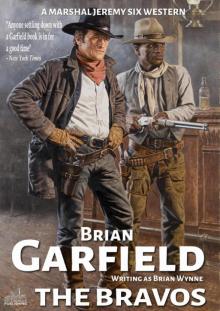 Marshal Jeremy Six #3
Marshal Jeremy Six #3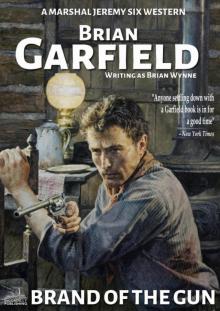 Marshal Jeremy Six #6
Marshal Jeremy Six #6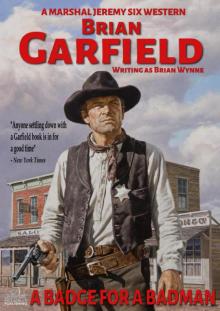 Marshal Jeremy Six #5
Marshal Jeremy Six #5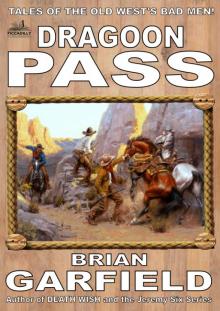 The Outlaws 2
The Outlaws 2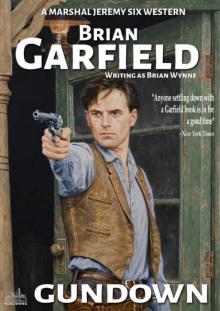 Marshal Jeremy Six #7
Marshal Jeremy Six #7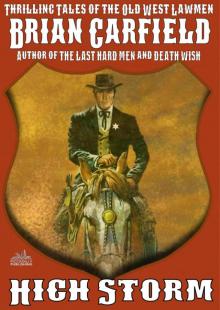 The Lawbringers 4
The Lawbringers 4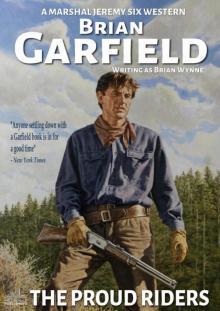 Marshal Jeremy Six #4 the Proud Riders
Marshal Jeremy Six #4 the Proud Riders The Romanov succession
The Romanov succession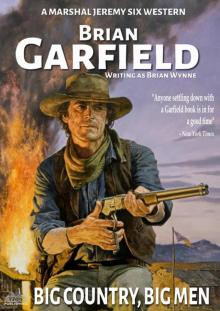 Marshal Jeremy Six #8
Marshal Jeremy Six #8 Sliphammer
Sliphammer Line of Succession
Line of Succession Deep Cover
Deep Cover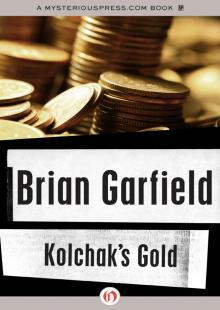 Kolchak's Gold
Kolchak's Gold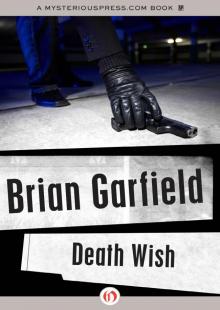 Death Wish
Death Wish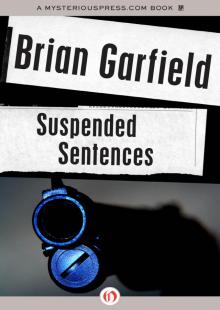 Suspended Sentences
Suspended Sentences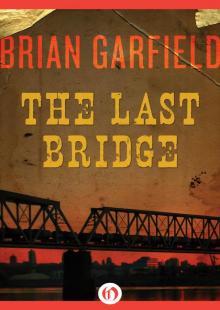 The Last Bridge
The Last Bridge Relentless
Relentless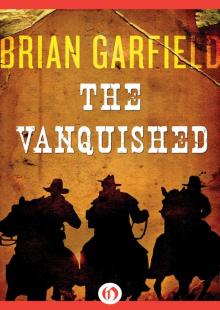 The Vanquished
The Vanquished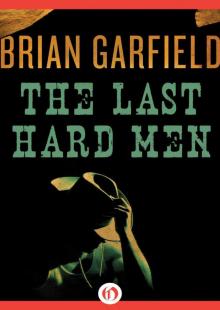 The Last Hard Men
The Last Hard Men Hit and The Marksman
Hit and The Marksman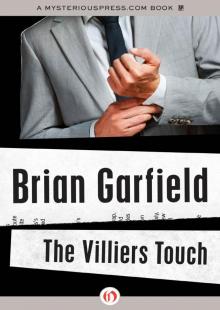 Villiers Touch
Villiers Touch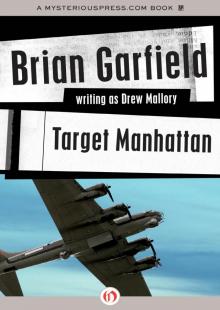 Target Manhattan
Target Manhattan Marchand Woman
Marchand Woman What of Terry Conniston?
What of Terry Conniston?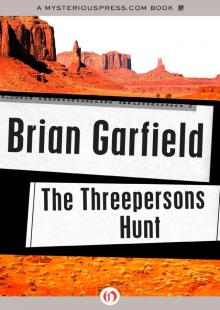 Threepersons Hunt
Threepersons Hunt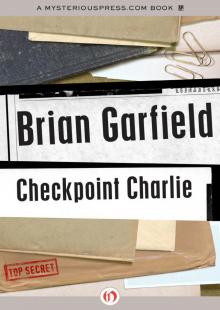 Checkpoint Charlie
Checkpoint Charlie Romanov Succession
Romanov Succession Necessity
Necessity Death Sentence
Death Sentence Fear in a Handful of Dust
Fear in a Handful of Dust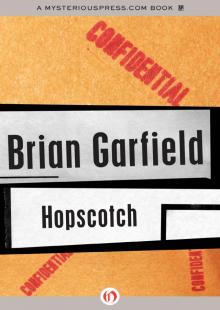 Hopscotch
Hopscotch